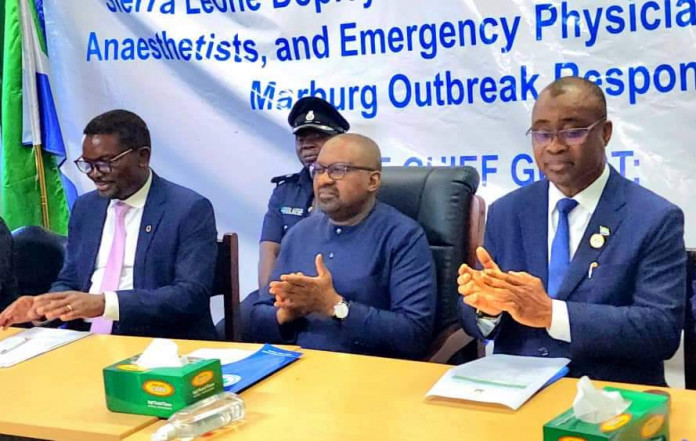By Amin Kef (Ranger)
In a noteworthy show of international solidarity, Sierra Leone has deployed a team of 20 medical professionals to Rwanda to assist in managing an ongoing outbreak of Marburg Virus Disease (MVD). The deployment follows the official farewell given by Sierra Leone’s Vice President, Dr. Mohamed Juldeh Jalloh, during a ceremony held on October 8, 2024.
The Vice President, in his remarks, emphasized the country’s commitment to global health security, particularly in times of crisis. “Sierra Leone is committed to standing with our African brothers and sisters in their time of need,” Dr. Mohamed Juldeh Jalloh stated. “This mission underscores our dedication to supporting regional health initiatives, particularly in managing epidemic outbreaks.”
Rwanda declared the Marburg outbreak on September 27, 2024, and as of October 7, the Rwandan Ministry of Health reported 56 confirmed cases, with 12 fatalities. Among the victims, many are healthcare workers, highlighting the urgent need for international support.
Marburg virus, part of the same family as the Ebola virus, causes severe hemorrhagic fever and is often fatal. With symptoms closely resembling Ebola, the virus is known to spread through contact with bodily fluids or contaminated surfaces. Sierra Leone’s familiarity with managing outbreaks, especially following the 2014-2016 Ebola epidemic, positions its medical professionals to provide critical aid in Rwanda.
The Sierra Leonean medical team will support Rwanda’s Case Management Pillar, providing essential care, training and resources. This mission marks the fourth time Sierra Leone has deployed a medical team to assist other nations since President Julius Maada Bio established the National Public Health Agency (NPHA). The deployment is a collaborative effort involving Sierra Leone’s Ministry of Health, the World Health Organization (WHO) and the Africa Center for Disease Control and Prevention (Africa CDC).
In a statement shared on the National Public Health Agency’s Facebook page, the Government highlighted the deployment as a testament to Sierra Leone’s “commitment to global health security.” Vice President Juldeh Jalloh, flanked by WHO Country Representative, Dr. Innocent Bright Nuwagira and Sierra Leone’s Deputy Minister of Health, Dr. Charles Senessie, led the farewell event.
Rwanda’s ongoing Marburg outbreak is the first reported in the country and health authorities are still investigating its origin. The Marburg virus was first discovered in a laboratory in Germany in 1967, believed to have been transmitted from African green monkeys. Since then, several outbreaks have been recorded in Sub-Saharan Africa, including in Angola, Uganda, Kenya and Tanzania. The largest Marburg outbreak to date occurred in Angola in 2005, claiming over 300 lives.
Although there is no approved antiviral drug for treating Marburg Virus Disease, patients receive supportive care to manage symptoms such as dehydration and blood loss. The Africa CDC recently announced a donation of 5,100 vials of remdesivir, a drug used in treating COVID-19, as part of an emergency effort to provide treatment for those affected by the virus. The donation was secured through a collaboration with Gilead Sciences, Inc.
In addition to remdesivir, approximately 700 doses of an experimental Marburg vaccine have been shipped to Rwanda as part of a clinical trial aimed at controlling the spread of the virus. WHO has launched an appeal for $7.7 million to support the Rwandan Government in its efforts to manage the outbreak. The funding will be used to bolster surveillance, infection prevention, community engagement and cross-border collaboration between Rwanda and neighboring countries.
This outbreak adds to the continent’s current health challenges, particularly with ongoing Mpox virus epidemics affecting countries like the Democratic Republic of Congo. As global and regional efforts intensify to curb the spread of these diseases, Sierra Leone’s proactive role in responding to the Marburg outbreak stands as a powerful example of African cooperation in the face of public health crises.




